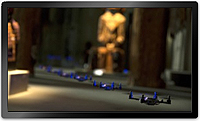Vijay Kumar and his students at the University of Pennsylvania build small, agile flying robots that swarm, sense each other, and form ad hoc teams that could be used for search and rescue in large-scale disasters.

Kumar, recognized around the world for his groundbreaking work on the development of autonomous robots and on biologically-inspired algorithms for collective behavior, will deliver the School of Engineering’s John R. and Donna S. Hall Engineering Lecture on Monday, October 12, at 4:10 p.m. in Jacobs Believed In Me Auditorium, 134 Featheringill Hall. A reception will follow in Adams Atrium.
Live video of the Hall Lecture will be streamed here on Engineering News, and archive video will be available for viewing after Oct. 14.
Autonomous tiny aerial robots can operate in three-dimensional indoor and outdoor environments and have applications for search and rescue, first response, construction, and precision farming. In his lecture – Aerial Robot Swarms – Kumar will describe the challenges in developing agile flying robots and the algorithmic challenges in coordinating large teams of robots, among other issues.
Two and a half months ago, Kumar became Nemirovsky Family Dean of Penn Engineering, with appointments in the departments of mechanical engineering and applied mechanics, computer and information science, and electrical and systems engineering. He joined Penn’s mechanical engineering department in 1987.
Lexus ‘Swarm’ ads, TED Talk
Starting in 2010, Vijay Kumar’s buzzing little four-propeller ships, winging out of his Penn lab into the world, scored hundreds of thousands of hits on Gizmodo and YouTube.
 Lexus, the luxury-car maker, worked balletic flights of quadcopters built by KMel Robotics, a firm started at Penn, into a kinetic series of TV ads called “Swarm.”
Lexus, the luxury-car maker, worked balletic flights of quadcopters built by KMel Robotics, a firm started at Penn, into a kinetic series of TV ads called “Swarm.”
Kumar’s public profile rose with his 16-minute 2012 TED Talk on applied air robotics. He reviewed the components of unmanned aircraft, contrasted familiar, exotic, and scaled systems, scanned the math, then unleashed a gang of copters built by two of his students. The two-ounce, four-rotor ships rose from steaming wrappings, hovered over a band stage, and played the “James Bond Theme” on keyboard, strings, and drums. Read more here.
Kumar was first – in the early 1990s – to formulate and solve the problem of cooperative mobile manipulation with multiple robots, and the first to work on the multi-robot formation control problem. That led to highly cited papers on the subject.
His creative theoretical, algorithmic, and experimental work on cooperating robots have transformed the science of robotics systems and impacted a wide range of applications in the area of networked and cyber-physical systems. He and his students have founded several companies using technologies and tools developed in his research programs.
The author of more than 400 refereed articles and papers and more than 20 books and book chapters, he is a member of the National Academy of Engineering and a Fellow of the American Society of Mechanical Engineers and of the Institute of Electrical and Electronic Engineers. Kumar received his Bachelors of Technology degree from the Indian Institute of Technology, Kanpur, and his Ph.D. from The Ohio State University in 1987.
He is the recipient of numerous awards and honors, including the National Science Foundation Presidential Young Investigator Award, Penn’s Lindback Award for Distinguished Teaching, the ASME Mechanisms and Robotics Award, the IEEE Robotics and Automation Society Distinguished Service Award, and the Engelberger Robotics Award.
Established in 2002, the John R. and Donna S. Hall Engineering Lecture Series allows Vanderbilt engineering students to hear renowned engineers from universities and agencies address engineering topics of particular interest.
Contact:
Brenda Ellis, (615) 343-6314
Brenda.Ellis@Vanderbilt.edu
Twitter @VUEngineering